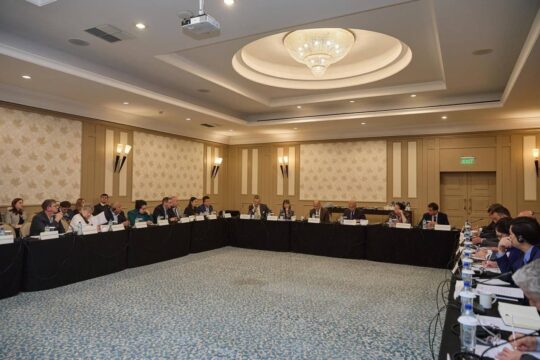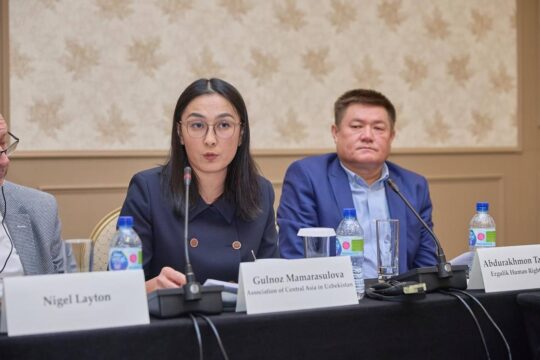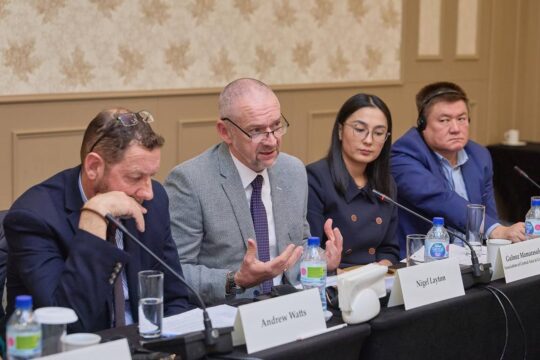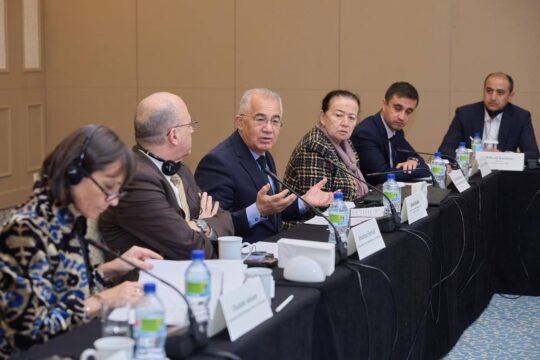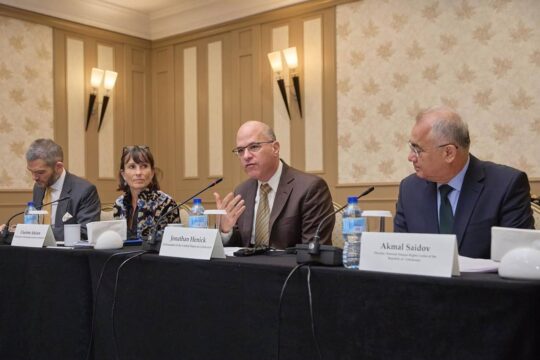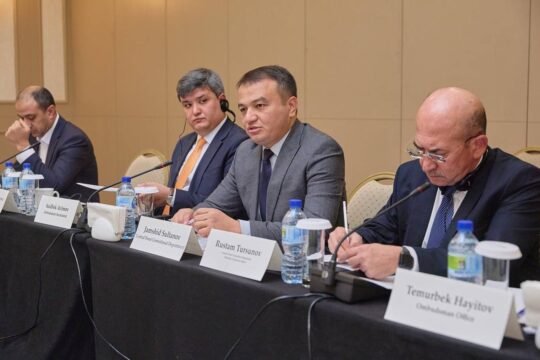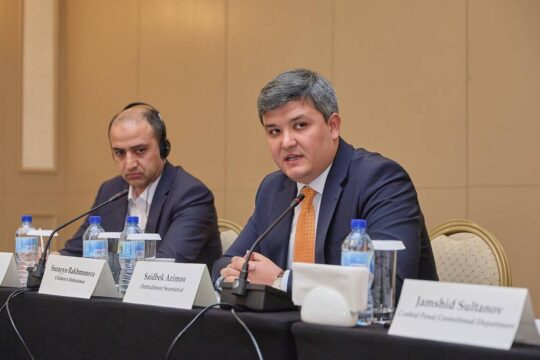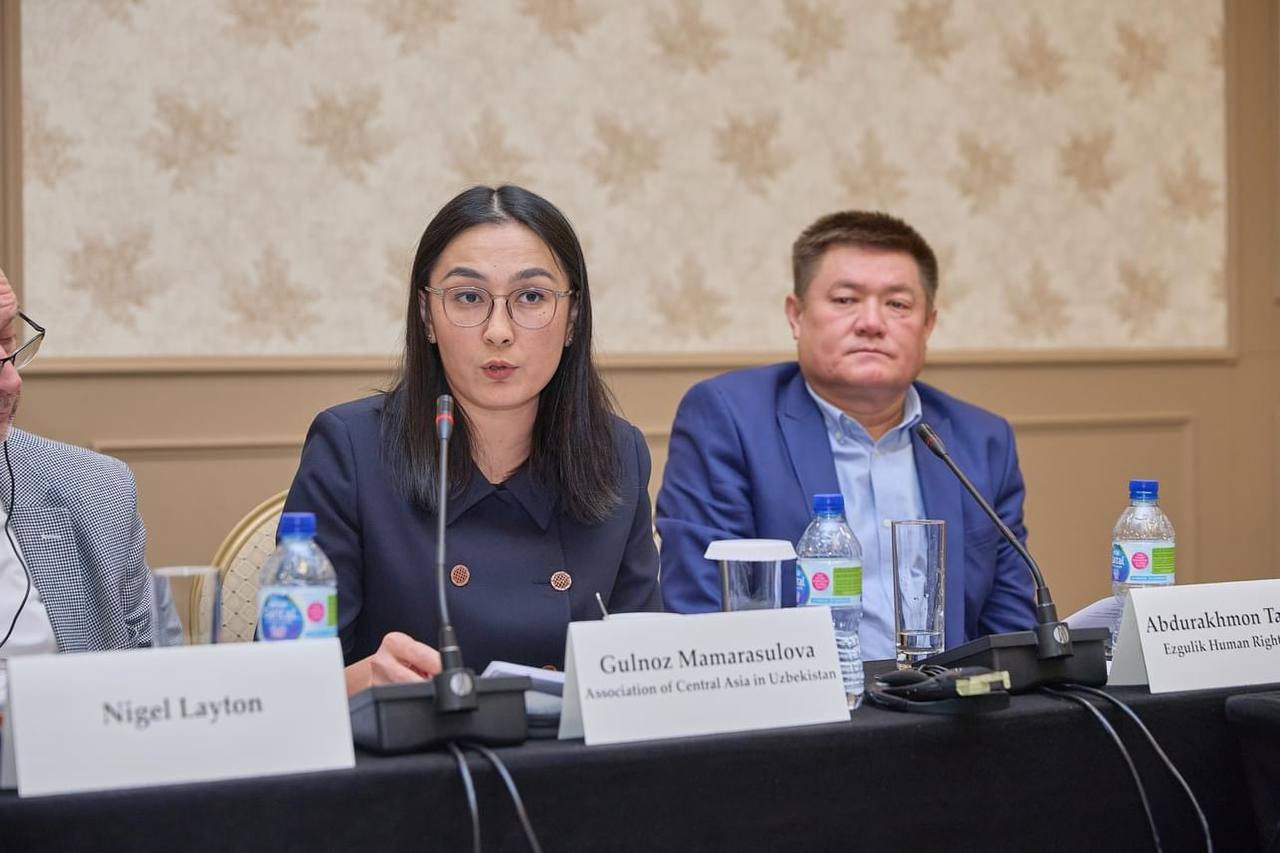Roundtable on Prison Conditions in Uzbekistan
Dear colleagues and participants,
I am Gulnoz Mamarasulova, the representative of the Sweden-based human rights organization Association Central Asia, which was registered by the Ministry of Justice in Uzbekistan in 2020.
I would like to congratulate you all on the 75th anniversary of the Universal Declaration of Human Rights. Despite persistent challenges, much important work has been done to improve the human rights situation in Uzbekistan in recent years. I hope that this will contribute to the practical implementation of the declaration in the country.
So far, I have monitored conditions in penal institutions and detention centers in the Tashkent region, Namangan, Bukhara, Khorezm and the Republic of Karakalpakstan. The monitoring focused on the quality of food prepared for prisoners, medical, living and other conditions, we made recommendations regarding the lack of visiting rooms, library facilities, lack of medical specialists and other problems.
Monitoring visits to places of detention, in particular penal colonies, are carried out by public groups for the detection and prevention of cases of torture under the Ombudsman. Starting from 2022, our organization, the branch office of Association Central Asia, participates in monitoring visits to prisons as part of public groups. During the monitoring visits, individual interviews are conducted with prisoners.
Last year, in prison No. 6 in Namangan region, we found that the rooms for long-term visiting with close relatives of prisoners, the living and dining rooms of the prisoners, and other conditions do not meet the standard requirements. I am happy to report that our recommendation to renovate these spaces was fully implemented, along with our recommendation to ensure washrooms and toilets are accessible for disabled prisoners.
Unfortunately, after an initial move towards liberalization of the penal system, we are witnessing a significant deterioration in the situation. Law enforcement agencies have become more severe, and laws are increasingly protecting the police, which has led to a deterioration in civil rights and protection from arbitrariness.
We remember how, by the end of 2017, well-known political prisoners were released. We, as human rights activists, and the international community then spoke about the arbitrariness of their imprisonment. But unfortunately, we are witnessing that similar cases are happening again. Reports of violence against detainees are increasing, including suspected suicides in prisons.
Visiting conditions often violate legal standards.
Recently, while monitoring the penal institution in Pop district, I witnessed a large number of people gathered in the waiting room. Interviews with them revealed the following problems: 1. Relatives who came to visit prisoners, often from distant regions, on the basis of a predetermined plan have to wait in line for several days because there are no available visiting rooms in the prison. 2. This costs them extra money because they have to stay in a hotel until their turn comes. 3. The time of their meeting with the prisoner is often reduced by the prison authorities. Instead of 3 days, as allowed by the law, a long-term visit is often reduced to 1 day. Prison officials say this situation is a result of a lack of visiting rooms.
- The state of medical service in prisons and non-disclosure of medical statistics
Living conditions in some prisons and detention centers remain difficult. The situation related to the provision of medical services is particularly alarming: the lack of medical specialists, lack of medicines for some diseases, and the poor quality of drinking water are just some of the factors that have a negative impact on the health of prisoners.
The problem of diseases in prisons deserves special attention. The lack of accurate statistical data on infectious diseases and the fact that this data is not made available to the public is a serious concern. Also, important statistics about the number of deaths in prisons, their causes, and the types of diseases that prisoners suffer from are not disclosed to the public.
Cases of tuberculosis and other infectious diseases in prisons are critically high. However, it is unclear what specific steps the authorities are taking to solve this problem. We hear desperate stories from relatives of prisoners who are forced to pay bribes so that their sick relatives receive some kind of medical attention.
- Issue of parcels
Another main issue is related to the reception by the prison staff of various necessary items such as packages, medicines, and parcels sent by the relatives of the persons detained in the penal institutions. Not only is this a huge expense for family members, but it also requires long waits for shipments to be checked at prison check-in points. Relatives of individuals reported long waits at the detention center for screening to send these items, and in many cases, their successful delivery involved illegal actions, including bribery.
- Labor issues
Another issue that caught my attention during the monitoring of prisons is related to the working conditions of prisoners using heavy equipment and construction materials and producing textile products and other types of work. They were working without special protective clothing. The interviews I conducted showed that prisoners are not sufficiently familiar with safety equipment and rules. Some of them noted that they work more than the permitted maximum working hours.
Our organization and our leader, Pulat Akhunov, who himself was a former political prisoner, several times addressed the need to create an independent oversight body for civilian control over the situation in correctional labor colonies, prisons and pre-trial detention centers.
In order to ensure the rights and freedoms of persons detained in penal institutions, we propose the following recommendations:
1. The Department of Corrections should increase the facilities for long-term visits with close relatives of prisoners.
2. Ensure Transparency and Access to Information: It is necessary to insist on transparency in prison operations and access to information about the status of prisoners and their conditions of detention. The Department of Corrections should provide general statistics on the health of prisoners.
3. In order to save time and prevent bribery, prisons should be equipped with an X-ray machine to speed up scanning of goods brought to the prisons by relatives and the documentation process for receiving goods simplified.
4. Activation of Civil Society: Intensify and enable the efforts of independent civil society groups to monitor the situation in prisons and prevent violations of the rights of prisoners.
5. Strengthen regulations and oversight of labor safety for prisoners and conduct further monitoring to learn about what kinds of labor they are engaged in.
I would like to thank you for your support in conveying these messages to our government. Only by working together can we make a difference and ensure justice and humanity for those behind bars. Thank you for your attention and willingness to support these important initiatives.
